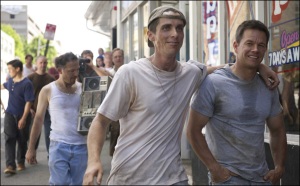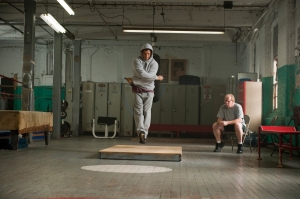David Campion on The Fighter: Raging O Russell
Posted: February 19, 2011 Filed under: Cinema, David Campion, Film Ache, Uncategorized | Tags: Amy Adams, Christian Bale, David Campion, David O Russell, Film Ache, Mark Wahlberg, The Fighter Leave a commentIt all started on Three Kings. Supposed battles with crew, scrapes with extras, and a blow up with everyone’s favourite liberal, George Clooney; say what you will about David O Russell, but the guy has heart. Speaking of heart, it was his next project, existential comedy I Heart Huckabees, which really sparked debate, when a video leaked of him kicking off at veteran actress, Lilly Tomlin. Both artist’s are obviously having a bad day, Tomlin herself is irritable and stressed, but after remaining silent for some time, O Russell lets spew a volcanic diatribe, resulting in pure YouTube gold.
These heated confrontations seem to be sparked by what makes O Russell special. He works in a loose, semi-improvised manner, giving his work a sense of urgency and spontaneity. However, there seems to be a communication failure somewhere between the great man and his accomplices, and this is his downfall. It’s no mystery why it’s taken six years for his next film, The Fighter, to be released.
Now in his fifties, it would appear the director has calmed down and possibly developed a new work ethic. The evidence of this new ethic is apparent in The Fighter, which is a lean, perfectly staged, exquisitely acted and directed piece of cinema. With a modest budget [somewhere around the $35 million mark], an ensemble cast [including a scenery chewing Christian Bale] and a very tight schedule [33 days]; The Fighter looks and feels like an effortless film.
Taking a very typical, cliché ridden underdog story and trying to inject it with a sense of vitality and importance is no mean feat. In fact, the boxing genre is one of the hardest to excel in, being overshadowed by both the archetypal underdog story, Rocky and the artful triumph, Raging Bull. These factors, along with long history of the film [four writers, two directors, endless star changes], should point towards cinematic disaster, so why does The Fighter work???
The Fighter is very much an examination, not only of character ambitions and family dynamics, but societal demands. First, the location. Lowell, Massachusetts is the perfect urban setting to raise a fighter, as it proves “livin’ ain’t easy”. The residents of this predominately working class community are vocal in their thoughts and opinions about the characters, giving Micky Ward [Mark Wahlberg] the ‘underdog complex’. He’s passive, which for a boxer, is a pretty useless quality. Now let’s examine the family. Mother Alice Ward has not only produced two fighters, but seven ‘monstrous’ sisters. Seemingly growing up in a grim fairytale, Micky has to deal not only with a firecracker mother, but a former glory, now-turned-addict brother, who still manages to soak up all of the family’s admiration. This lack of love and nurture has obviously had a negative effect on Micky’s confidence, which could be a direct reason for his ‘stepping-stone’ reputation in the ring.
Dicky Ward [Christian Bale] is like a vacuum, demanding all of the attention from almost every character in the film. Interestingly, outside the realms of the film, Christian Bale is doing the same, receiving award nominations across the board and being the cast/crew member most likely to pick up an Oscar. I like to think his performance is in retaliation to The Dark Knight, where Heath Ledger picked up all of the accolades for his supporting turn as The Joker, while Bale had to play it straight. Now in the ‘joker’ role, Bale relishes every moment he is on screen, perfectly playing a waster way beyond his prime.
Amongst all this chaos, O Russell keeps a tight handle over the script, never deviating away from the all important structure. However, unlike more ‘mainstream’ affairs, The Fighter has a sense of truth. The supporting characters aren’t mere obstacle blocks, but living, breathing people. Occasionally flawed, but always likeable, each actor takes the character to a place of familiarity, enabling the audience to not only identify with them, but to emphasise with them as well.
Stylistically, O Russell has always had plenty of tricks up his sleeve. He moves the camera with pace, never restricting the moving shots to dollies, but employing vehicles to give them speed and excitement. However, his genius comes within the ring. Rather than competing with the untouchable Raging Bull, O Russell chooses to shoot the fight scenes using ‘video footage’. He captures the brutality within the ring, but from a perspective everybody is familiar with. Even when it comes to using slow motion he doesn’t sell out by using 35mm for a smooth finish, but allowing the jerkiness of the ‘HBO’ style to shine through. The direction in the film is non fussy and kinetic.
Whatever your opinions are of David O Russell, past or present, you really can’t question his integrity. As a successor of the ‘Sundance Kids’ stable, O Russell has established himself as an auteur. Much like Aronofsky [the once director of The Fighter, now billed as executive producer], O Russell’s next project is distinctly ‘Hollywood’. He is in talks to direct a feature based on the popular video game, Uncharted. So, in two-three years time, will two of the better ‘indie’ artists be battling it out for summer box office? Personally, I’m looking forward to Oscar race between Brett Ratner and Michael Bay.
David Campion is the Co – Director of Patrol Men
Follow FilmAche on Twitter








Recent Comments